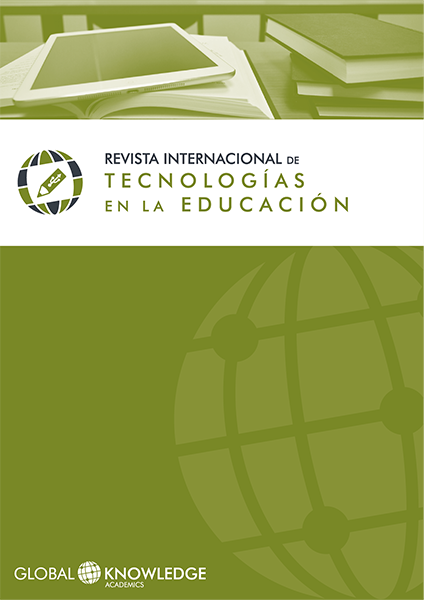Pedagogical Uses of ICT according to the Creative Activity of the Discent: From consumption to participatory co-creation
DOI:
https://doi.org/10.37467/gka-revedutech.v6.1618Keywords:
Technology Enhanced Learning, ICT integration, Educational Technology, Information and Communication Technologies, Educational Uses of ICTAbstract
Integrating information and communication technologies (ICT) in education has generated great hopes and, in some cases, it has produced technological innovations without the basic educational foundations. Some pedagogical uses of ICT improve learning mediated by technology (Laferrière et al., 2015) but we also observe some uses of ICT that place students in situations of passive or interactive consumption. With the purpose of integrating ICT to improve learning and to analyze the limits of passive or interactive consumption, we present five levels of educational uses of ICT. First, passive consumption (eg videos); second, interactive consumption (eg interactive schoolbooks); in third and fourth place the creation of individual or team content (eg create a story), and finally, the participatory co-creation of knowledge, aimed at understanding or solving problems and conceived within a learning community.
Global Statistics ℹ️
|
708
Views
|
105
Downloads
|
|
813
Total
|
|
References
Amadieu, F. y Tricot, A. (2015). Apprendre avec le numérique: mythes et réalités. Retz. DOI: https://doi.org/10.14375/NP.9782725633206
Area Moreira, M. (2005). Las tecnologías de la información y comunicación en el sistema escolar. Una revisión de las líneas de investigación. Revista Electrónica de Investigación Y Evaluación Educativa, 11(1). Retrieved from https://www.uv.es/RELIEVE/v11n1/RELIEVEv11n1_1.htm DOI: https://doi.org/10.7203/relieve.11.1.4194
Hamel, C. y Allaire, S. (2014). Guide d’animation d’un forum de discussion. Retrieved from http://www.tact.fse.ulaval.ca/fr/html/outils/animation_forum/index.htm.
Jeremić, Z., Milikić, N., Jovanović, J., Brković, M. y Radulovic, F. (2012). Using online presence to improve online collaborative learning. International Journal of Emerging Technologies in Learning, 7(Specia), 28–35. https://doi.org/http://dx.doi.org/10.3991/ijet.v7iS1.1918 DOI: https://doi.org/10.3991/ijet.v7iS1.1918
Kirschner, P. A. y van Merriënboer, J. J. G. (2013). Do Learners Really Know Best? Urban Legends in Education. Educational Psychologist, 48(3), 169–183. https://doi.org/10.1080/00461520.2013.804395 DOI: https://doi.org/10.1080/00461520.2013.804395
Laferrière, T., Beaudoin, J., Gaudrealt-Perron, J., Bourget, C., Mallette-Vanier, G. y Racine, S. (2015). Usages du numérique dans les écoles québécoises - Rapport synthèse. Cefrio, l’expérience du numérique. Retrieved from http://www.cefrio.qc.ca/media/uploader/Rapport-synthese_Usages_du_numerique_dans_les_ecoles.pdf
Nizet, I. y Laferrière, T. (2005). Description des modes spontanés de co-construction de connaissances: contributions à un forum électronique axé sur la pratique réflexive. Recherche et Formation, 48, 151–166. DOI: https://doi.org/10.3406/refor.2005.2071
OECD. (2015). Students, Computers and Learning: Making the Connection. Paris: OECD Publishing. Retrieved from http://dx.doi.org/10.1787/9789264239555-en DOI: https://doi.org/10.1787/9789264239555-en
Romero, M. (2015). Intergenerational learning, life narratives and games - SGISS 2015 Proceedings (Vol. 1). Université Laval. Centre de recherche et d’intervention sur la réussite scolaire. Retrieved from http://lel.crires.ulaval.ca/public/sgiss2015-proceedings-actes-r21.pdf
Selwyn, N. (2004). Reconsidering Political and Popular Understandings of the Digital Divide. New Media & Society, 6(3), 341–362. https://doi.org/10.1177/1461444804042519 DOI: https://doi.org/10.1177/1461444804042519
Stahl, G., Cress, U., Law, N. y Ludvigsen, S. (2014). Analyzing the multidimensional construction of knowledge in diverse contexts. International Journal of Computer-Supported Collaborative Learning, 9(1), 1–6. DOI: https://doi.org/10.1007/s11412-014-9189-4
Valverde Berrocoso, J., Garrido Arroyo, M. C. y Fernández Sánchez, R. (2010). Enseñar y aprender con tecnologías: un modelo teórico para las buenas prácticas educativas con TIC. Revista Teoría de La Educación: Educación Y Cultura En La Sociedad de La Información, 11(1), 203–229. Retrieved from http://revistatesi.usal.es/~revistas_trabajo/index.php/revistatesi/article/view/5840/5866 DOI: https://doi.org/10.14201/eks.5840
Downloads
Published
How to Cite
Issue
Section
License
Those authors who publish in this journal accept the following terms:
- Authors will keep the moral right of the work and they will transfer the commercial rights.
- After 1 year from publication, the work shall thereafter be open access online on our website, but will retain copyright.
- In the event that the authors wish to assign an Creative Commons (CC) license, they may request it by writing to publishing@eagora.org







